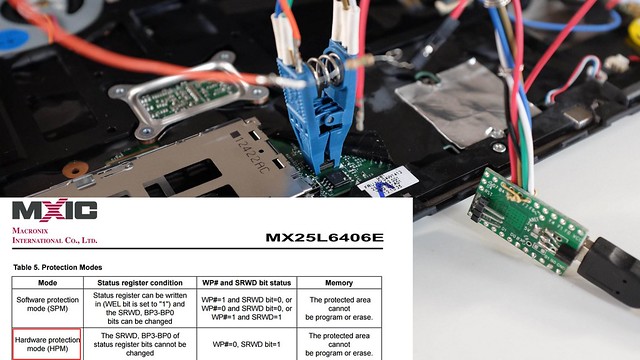-coreboot support of TPM v2.0 (shared config for TPM2 support across all 4 previous variations) -swtpm set to be launched under TPM v2.0 mode under board config -Documentation file under each board.md softlinks to qemu-coreboot-fbwhiptail-tpm1.md (which has been generalized) This is skeleton for TPM v2 integration under Heads ------------- WiP TODO: - libcurl cannot be built as a tpm2-tools dependency as of now not sure why. curl currently needs to be added in board config to be built - Note: tpm-reset (master and here) needs some review, no handle of no tpm use case. Caller is responsible to not call it otherwise does nothing - init tries to bind fd and fails currently - Note: Check if whiptail is different of fbwhiptail in clearing screen. As of now every clear seems to be removed, still whiptail clears previous console output - When no OS' /boot can be mounted, do not try to TPM reset (will fail) - seal-hotpkey is not working properly - setting disk unlock key asks for TPM ownership passphrase (sealing in NV requires ownership, but text is misleading user as if reowning TPM) - We should cache input, feed tpm behind the scene and wipe passphrase and state clearly that this is TPM disk unlock kye passphrase. - primary key from TPM2 is invalid most of the time from kexec-select-boot and verifying global hashes but is setuped correctly at disk unlock key setup - would be nice to take advantage of bash function tracing to understand where we are for debugging purposes, code takes ash in consideration only - tpmr says it implements nv calls but actually doesn't. Removing those falsely wrapped functions would help. - Implementing them would be better - REVIEW TODOS IN CODE - READD CIRCLECI CONFIG Current state: - TPM unseal works without disk unlock key and generates TOTP properly (was missing die condition at unseal to not produce always good TOTP even if invalid) - TPM disk encryption key fails. Hypothesis is that sealing with USB drivers loaded and measures in inconsistent with sealed with/without. - TPM disk unsealing happens without USB modules being loaded in non-HOTP setup. This fails. - Current tests are with fbwhiptail (no clear called so having traces on command line of what happens) - Testing with HOTP implementation for sealing/unsealing since that forces USB module loads on each boot to remove this from failing possibilities
Heads: the other side of TAILS
Heads is a configuration for laptops and servers that tries to bring more security to commodity hardware. Among its goals are:
- Use free software on the boot path
- Move the root of trust into hardware (or at least the ROM bootblock)
- Measure and attest to the state of the firmware
- Measure and verify all filesystems
NOTE: It is a work in progress and not yet ready for non-technical users. If you're interested in contributing, please get in touch. Installation requires disassembly of your laptop or server, external SPI flash programmers, possible risk of destruction and significant frustration.
More information is available in the 33C3 presentation of building "Slightly more secure systems".
Documentation
Please refer to Heads-wiki for your Heads' documentation needs.
Building heads
make BOARD=board_name where board_name is the name of the board directory under ./boards directory.
In order to build reproducible firmware images, Heads builds a specific
version of gcc and uses it to compile the Linux kernel and various tools
that go into the initrd. Unfortunately this means the first step is a
little slow since it will clone the musl-cross-make tree and build gcc...
Once that is done, the top level Makefile will handle most of the
remaining details -- it downloads the various packages, verifies the
hashes, applies Heads specific patches, configures and builds them
with the cross compiler, and then copies the necessary parts into
the initrd directory.
There are still dependencies on the build system's coreutils in
/bin and /usr/bin/, but any problems should be detectable if you
end up with a different hash than the official builds.
The various components that are downloaded are in the ./modules
directory and include:
We also recommend installing Qubes OS,
although there Heads can kexec into any Linux or
multiboot
kernel.
Notes:
- Building coreboot's cross compilers can take a while. Luckily this is only done once.
- Builds are finally reproducible! The reproduciblebuilds tag tracks any regressions.
- Currently only tested in QEMU, the Thinkpad x230, Librem series and the Chell Chromebook. ** Xen does not work in QEMU. Signing, HOTP, and TOTP do work; see below.
- Building for the Lenovo X220 requires binary blobs to be placed in the blobs/x220/ folder. See the readme.md file in that folder
- Building for the Librem 13 v2/v3 or Librem 15 v3/v4 requires binary blobs to be placed in the blobs/librem_skl folder. See the readme.md file in that folder
QEMU:
OS booting can be tested in QEMU using a software TPM. HOTP can be tested by forwarding a USB token from the host to the guest.
For more information and setup instructions, refer to the qemu-coreboot-fbwhiptail-tpm1-hotp documentation.
coreboot console messages
The coreboot console messages are stored in the CBMEM region
and can be read by the Linux payload with the cbmem --console | less
command. There is lots of interesting data about the state of the
system.

